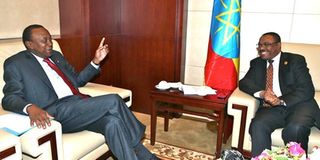Uhuru Kenyatta: Let’s have an African-funded court

President Uhuru Kenyatta, left, with Ethiopian Prime Minister Hailemariam Desalegn on the sidelines of the 24th African Union Summit in Addis Ababa on January 31, 2015. PHOTO | PSCU
What you need to know:
- Even if the protocol is ratified, it is unlikely it could take over the case against Mr Ruto and Joshua arap Sang.
ADDIS ABABA
Kenya on Saturday evening pledged to contribute $1 million (Sh90 million) towards the establishment of the African Court of Justice and Human Rights, the continent’s version of the International Criminal Court (ICC).
President Uhuru Kenyatta made the pledge at the African Union Heads of State Summit in Addis Ababa as the Kenyan push to have the court’s mandate expanded to include crimes against humanity gained the support of 11 countries.
The President’s pledge is intended to show Kenya’s commitment to the setting up of the court and was part of the strategy to get support for the protocol signed in Malabo, Equatorial Guinea, last year.
“I urge you brothers and sisters to join me in ensuring that the necessary ratifications are in place and that the resulting court is fully owned, financed and driven by Africa. This is an urgent and historic task that cannot wait,” said President Kenyatta.
He said the continent should not wait for the reform of the ICC “when we have the power, and indeed the duty, to take our destiny into our own hands”.
The Head of State described the continent’s relationship with the ICC, which he said “poses a grave risk to peace and security not only in Africa, but to the whole world,” as an acid test of the continent’s place in the international community.
He said that from its handling of the Kenyan cases, the ICC had progressively breached the Rome Statute’s critical cornerstones of complementarity, admissibility, threshold and gravity.
At the closed-door session of the Summit on Saturday evening, the State House spokesman posted on Twitter statements by Ethiopian Prime Minister Hailemariam Desalegn and Zimbwabe’s Robert Mugabe against the ICC.
Mr Desalegn was reported to have said that the ICC must drop the case against Mr Ruto. And the new African Union chairman, Mr Mugabe, said that Africa must pull out of the ICC.
“It (the debate) must be on the agenda of the next AU Summit in June in South Africa,” said Mugabe who is also the President for Zimbabwe.
President Mugabe was speaking during the closing ceremony of the 24th AU summit which ended in Addis Ababa, Ethiopia, on Saturday.
Earlier, Foreign Affairs Cabinet Secretary Amina Mohammed said many of the countries attending the closed-door sessions at the African Union Heads of State Summit had pledged to sign and ratify the protocol adopted in Malabo in Equatorial Guinea last year.
Two more countries — Benin and Guinea Bissau — signed the Malabo Protocol while nine were reported to have made a commitment to sign and have it ratified.
But with only 11 of the minimum 14 other countries needed to give the African Court of Human Rights and Justice indicating their support, it appeared too early to declare success on the agenda the country took to Addis Ababa.
Still, Ms Mohammed was optimistic the proposal would get the support needed before long.
SIGN AND RATIFY
“We’ve had a lot of support for the court from many of the countries that have attended the sessions, both in their statements and in their actions. Some of them will be signing, others need to take them back for the procedures before they can sign and ratify,” said Ms Mohammed before the close of the Summit.
The ministry said Mauritania, Sudan, the Democratic Republic of Congo, Uganda, Zimbabwe, Ethiopia, Tanzania, Burundi and Rwanda had indicated their support.
“The others probably need a little more time, and you grant them that. There are very many other instruments we haven’t signed on to because we need the time to make sure our processes and procedures are adhered to,” she added.
The minister added: “There is a lot of support. Look at the statements that were made and you’ll not find one country that has indicated that they will not be party to this court. It’s just a matter of time but we came prepared.”
Ms Mohammed said Kenya had pledged human and financial resources for the establishment of the court and that the protocol for the expansion of its mandate would now be taken to Parliament for ratification.
On Saturday, African Union Commissioner for Peace and Security Smail Chergui told a press conference that the withdrawal from ICC was “the best thing that could have happened”.
“I am aware that the process of ratification is on-going. Anything that can resolve conflicts in Africa is welcome,” he added.
Mauritanian President Mohammed Ould Abdelaziz on Friday described the withdrawal of the charges against President Kenyatta as “a victory for all of us.”
“We need to operationalise the African Court of Justice in order to take over similar cases,” he told his colleagues at the Summit.
The endorsement of the protocol was one of Kenya’s strategies in the Jubilee Coalition’s decision to put political and diplomatic pressure on the ICC to drop the case against Deputy President William Ruto.
Even if the protocol is ratified by the minimum 15 countries, it is unlikely it could take over the case against Mr Ruto and former journalist Joshua arap Sang.





